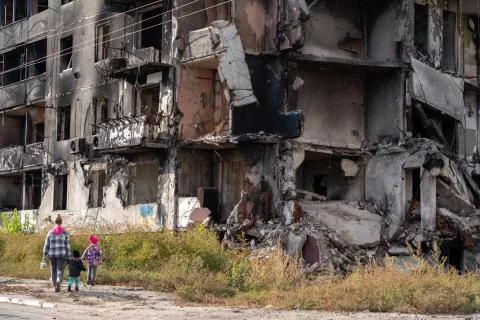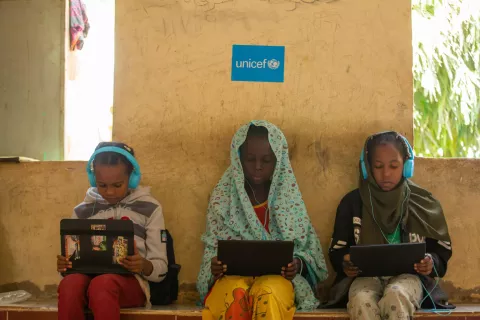Modu’s big dreams: Back to school in north-east Nigeria
After fleeing Boko Haram violence several months ago, Modu is finally returning to his hometown with his family. Like many other children in the region, he is happy to be back in school and working hard for a better future.

MONGUNO, Nigeria, 17 November 2016 – Modu Umar is 13 years old and when he grows up he wants to be a doctor. Or maybe a policeman. Or possibly a lawyer. He hasn't quite made up his mind yet, but it's clear this little boy from Monguno in north-east Nigeria has big dreams. And he knows he'll have to work hard to achieve them.
"If I become a big boy and finish school," Modu says in confident English, "If I go to be a doctor, English and maths will help me!"
But for many months, it looked like Modu's dreams wouldn't become a reality.
Along with his family, he fled Monguno when ongoing attacks on the town by Boko Haram made it too dangerous to stay. Like many thousands of others, they took refuge in a host community in Maiduguri, the state capital. Modu briefly attended a school there, before the fighting closed that one too.
“I used to feel like crying," Modu says, "when I saw other children with uniforms and bags going to school.”
Widespread displacement
Modu’s home of Borno State is the epicentre of the humanitarian crisis that has been unfolding in Nigeria and the Lake Chad region since mid-2013. In Borno alone, more than 1.3 million people have been displaced as a result of Boko Haram violence, while an estimated 2.2 million people currently remain inaccessible to humanitarian actors.
Many of the children caught in the conflict have lost years of education. Schools are often targets of Boko Haram attacks, and more than 1,800 schools in the Lake Chad region have been closed, damaged, looted, set on fire or used to shelter displaced persons.
UNICEF aims to reach 586,400 school-aged children, including adolescents, with safe learning environments and learning materials by the end of the year.
>> Donate now to help children affected by the Nigeria and Lake Chad crisis
Schools turned into camps
A tentative security is now in place in Monguno, and along with it thousands of displaced people like Modu have returned home. Families are looking for safe places to stay, and many schools that had been closed because of the violence have become camps for internally displaced people.

Central Primary School is one of them. Make-shift tents, constructed out of a combination of plastic tarpaulin and reed mats, fill the school's playground. For many months, a return to normal school life seemed impossible. But with support from UNICEF, four classrooms in this school reopened in mid-October.
Modu is one of the children going to classes here. In the short-term, lessons are offered to children of all ages and comprise basic English and maths lessons. With a wide smile, Modu joins in with his classmates in an English lesson.
"I am walking," the teacher says,
"I am walking!" about 40 children call back.
Safe spaces to learn
UNICEF has helped nearly 90,000 children across north-east Nigeria back into education. When no existing school rooms are available, UNICEF sets up safe, temporary learning spaces.
At the Muna Garage internal displacement camp in central Maiduguri, UNICEF has set up eight temporary classrooms, along with a playground containing swings, a slide and a merry-go-round. More than 1,500 children from the camp come here for daily lessons in English and maths. For some of the children, it's the first time they've ever stepped foot in a classroom.
"Most of them have never been to school," says UNICEF's Education Specialist Yusef Ismail. "But when UNICEF provided the enroled [children] with school kits, school uniforms, and they have seen them chanting, singing, it has now encouraged almost all children in the camp to enrol."
"Now it seems they like school more than I do!" he adds with a smile.




